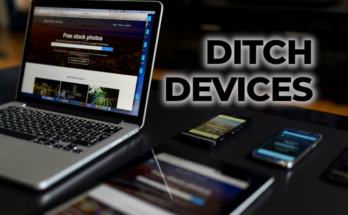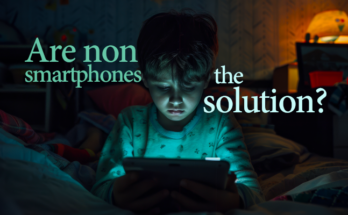Will AI redefine career paths and job markets, leaving professionals questioning their roles? Is AI replacing human efforts in a rapidly changing landscape?
“Hey, Mark, have you noticed how AI seems to be taking over more and more of what we do?” As they took a breather over coffee, Ravi couldn’t shake off his concerns about the growing influence of AI.
Mark nodded, a sympathetic grin on his face. “Oh yeah, it’s like we’re in a high-stakes game against the machines, isn’t it?”
Ravi sighed, stirring his coffee absentmindedly. “Exactly! I mean, we’re good at what we do, but with AI advancing so fast, I can’t help but feel a bit… well, redundant.“
Mark leaned in, a comforting tone in his voice. “Hey, I get it, Ravi. It’s like we’re dancing on shifting sands, never quite sure where to step next.“
Ravi nodded, his worries laid bare. “Yeah, it’s just… scary, you know? What if one day our skills aren’t enough?“
Mark reached out, giving Ravi’s shoulder a reassuring squeeze. “Hey, we’re not going down without a fight. We’re adaptable, remember? But yeah, in a world where AI seems to call the shots, it’s hard not to wonder where we fit in.“

Isn’t AI causing a stir in the job market? Everywhere you look, it’s making headlines. Take ChatGPT, for example. Google also just introduced a new AI tool that can do it all: presentations, number crunching, even content writing. And Google’s not alone; there are loads of other AI tools popping up too.
Missing the AI train could mean missing out on job opportunities in the coming years. But don’t sweat it! While AI replacing human might snatch some jobs, it’s also creating new ones. So, how do we navigate this changing job landscape?
Content Overview
- AI: Is It Helping or Hurting the World?
- Will AI affect jobs and careers?
- Jobs at High Risk of being Impacted by AI
- Jobs at Moderate Risk of being Impacted by AI
- Jobs at Low Risk of being Impacted by AI
- New Jobs likely to emerge as a result of AI
- Embracing AI: Mastering Skills for the Future Tech Revolution
- Common Queries (FAQs)
- Editor's Note
AI: Is It Helping or Hurting the World?
AI’s impact on the workforce is really a mixed bag. On one hand, it’s great because it automates all those repetitive tasks and changes what skills we need. This can be a huge benefit because it frees people up to focus on more complex and creative work.
But, let’s be honest, it’s not all sunshine and rainbows. There’s a real concern about job displacement. What happens when AI takes over your job? Think about all the roles like customer service reps, receptionists, and data entry clerks that AI can easily replace. Some people might lose their jobs, and others might need to learn new skills to keep up. That can be pretty stressful, right?
Even though AI is opening up new job opportunities, especially in data analytics, machine learning, and AI development, there are still plenty of worries. One big one is how AI replacing human roles can involve biased and discriminatory algorithms. Have you thought about how unfair that can be?
And we can’t forget about privacy and security. As AI gets more advanced, it’s crucial to ensure that personal data is protected and that AI systems are secure from cyberattacks. Despite these concerns, AI can definitely boost efficiency and productivity, and its advancements might create new jobs for those with the right skills and knowledge.
So, it’s a bit of a balancing act. There are benefits, but we have to watch out for the pitfalls too. Are we ready for this change?
Will AI affect jobs and careers?
Absolutely, and in some pretty big ways. AI is changing everything from how we work to the kinds of jobs available. It’s not just about making things faster or easier; it’s reshaping entire industries.
A report from McKinsey & Company says AI could mean 375 million workers globally (14 percent of the global workforce) will likely need to transition to new occupational categories and learn new skills. 50% of current work activities are technically automatable and AI could come into picture.
There’s a lot of worry about job displacement. What happens when AI takes over repetitive tasks? People are scared that their skills might become obsolete. Imagine being in a job for years and suddenly needing to learn something completely new. It’s a bit overwhelming, right?
As AI keeps growing and changing, it’s crucial to see how AI replacing human roles is affecting jobs, what new jobs are popping up, and how it might impact unemployment rates and the economy.
Let’s explore how each job role is impacted by this situation.
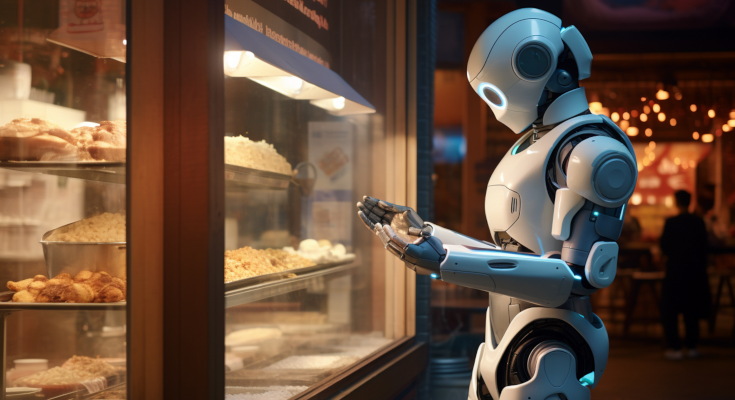
Jobs at High Risk of being Impacted by AI
1) RETAIL
Alright, listen up! With online shopping on the rise, AI-powered systems can recommend products tailored to your tastes. Sounds cool, right? But hold up, what about all the retail workers? If stores start relying more on machines than people, that’s a tough spot for those who rely on those jobs to pay the bills. It’s like the world’s changing right before our eyes!
2) ACCOUNTANTS / BOOK-KEEPERS
So, here’s the deal. AI can crunch numbers faster than you can blink. It’s like having a super speedy calculator. That means with AI replacing human roles, tasks accountants and book-keepers do, like balancing sheets and tracking expenses, can be done in a snap. But hey, does that mean our number-crunching buddies might need to find new ways to add value?
3) RECEPTIONISTS
Imagine this: AI-powered virtual assistants can handle calls, schedule appointments, and even answer questions. It’s like having a super-efficient receptionist in your pocket! But what about all the real-life receptionists out there? Are they feeling a little nervous about what the future holds?
4) SALES-PEOPLE
AI can read minds… well, almost! It can analyze data to predict what customers want before they even realize it themselves. Mind-blowing, huh? But hold up, what does that mean for salespeople? Convincing someone to buy something might just become a whole new ball game. Are they ready to step up their game and get even more creative to seal the deal?
5) DATA ENTRY CLERKS
Picture this: AI can zip through piles of paperwork faster than you can say “paper cut.” It’s like having a speedy data ninja on your team! But what happens to all the data entry clerks who used to do those tasks? Are they feeling a bit unsure about what comes next?
6) RESEARCHERS AND ANALYSTS
AI can sift through mountains of data faster than you can say “data overload.” But does that mean human researchers and analysts are out of a job? Not necessarily. Sure, AI can help with the heavy lifting, but human intuition and critical thinking still play a big role. It’s like having a trusty sidekick!
7) ASSEMBLY LINE WORKERS
Robots can now handle repetitive tasks on assembly lines with precision and speed. It’s like living in a sci-fi movie! But what about the folks who used to work those lines? Are they feeling a bit anxious about what the future holds for them?
8) WAREHOUSE WORKERS
Get this: robots can zip around warehouses, picking and packing orders like nobody’s business. It’s like something out of a sci-fi movie! But what does that mean for all the folks who used to do those jobs? Are they going to have to find new gigs?
9) CASHIERS AND TELLERS
Check this out: self-checkout machines and online banking mean fewer people need to handle cash transactions. It’s like technology taking over the cash register! But what about all the cashiers and tellers who rely on those jobs to make ends meet? Are they feeling a bit worried about their futures?
10) INSURANCE SALES AGENTS
AI can analyze data to assess risk and calculate premiums faster than you can say “insurance.” But does that mean insurance sales agents are out of luck? Not quite. Building relationships and providing personalized advice are still super important. It’s like being a trusted advisor!
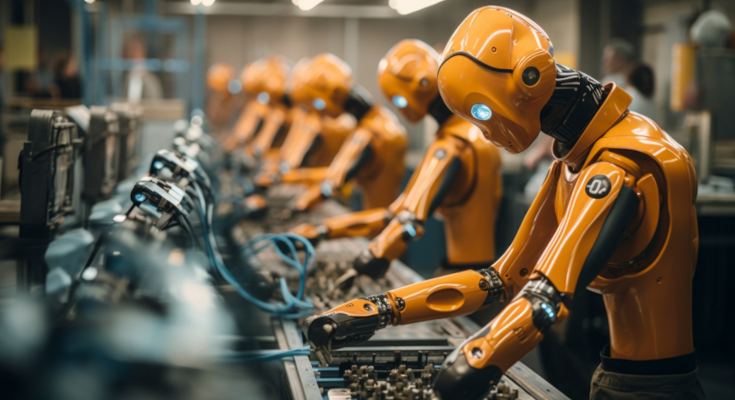
Jobs at Moderate Risk of being Impacted by AI
1) PARA-LEGALS AND LEGAL ASSISTANTS
So, here’s the scoop: AI is getting pretty good at sorting through legal documents at lightning speed. It’s like having a supercharged legal assistant! But don’t worry too much, folks in these roles might just need to adapt a bit. They might need to brush up on some new skills to stay ahead of the game.
2) FACTORY SUPERVISORS AND MACHINE OPERATORS
Get this: robots are starting to take on more tasks on the factory floor, making things run smoother and faster. It’s like the factory of the future is here! But hey, with AI replacing human roles, supervisors and machine operators might not need to stress too much. They could adjust to these changes with some reskilling and adaptation.
3) CUSTOMER SERVICE REPRESENTATIVES
AI-powered chatbots are becoming pretty good at handling routine customer inquiries. It’s like having a virtual customer service team! But hold on, customer service reps might not need to panic. They could adapt by learning new skills to keep up with the times.
4) LOAN OFFICERS AND UNDERWRITERS
AI can crunch numbers and assess loan applications in record time. It’s like having a financial whiz on your side! But don’t sweat it too much, loan officers and underwriters could navigate these changes by picking up some new skills to stay competitive in the field.
5) TAX PREPARERS
AI can handle tax forms and calculations faster than you can say “tax season!” It’s like having a tax expert at your fingertips. But hey, tax preparers might not need to worry too much. They could stay ahead of the curve by brushing up on some new techniques.
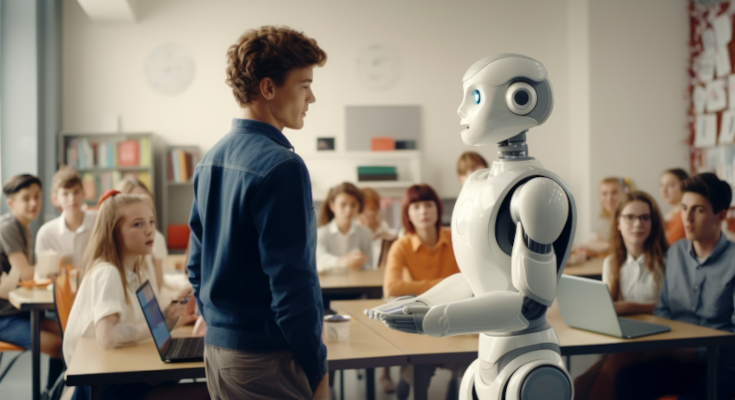
Jobs at Low Risk of being Impacted by AI
1) THERAPISTS
Let’s talk about therapists. They’re like emotional superheroes, right? AI might be good at crunching numbers, but can it understand human emotions like a therapist can? Probably not! That’s why therapists might not feel the AI impact as much. Their jobs are all about human connection, something AI can’t replicate.
2) COUNSELORS
Counselors are like guides through life’s tough moments. AI might be good at giving advice based on data, but can it truly empathize with someone going through a rough patch? Unlikely! Counselors bring that human touch that AI just can’t match. That’s why their jobs are pretty safe from the AI takeover.
3) SOCIAL WORKERS
Social workers are like champions for those in need. AI might be good at processing information, but can it advocate for someone in a tough situation? Not really! Social workers bring compassion and empathy to their work, qualities that can’t be replicated by AI. That’s why their jobs are considered low risk when it comes to AI impact.
4) TEACHERS
Alright, let’s talk about teachers. They’re like beacons of knowledge in a sea of uncertainty, right? Sure, AI can help with lesson plans and grading, but can it inspire students and nurture their curiosity? Not quite! Teachers bring that special spark to the classroom that AI can’t replicate. That’s why their jobs are pretty safe from the AI wave.
5) EDUCATORS
Educators are like architects of the mind, shaping future generations. Sure, AI can deliver content and assessments, but can it build meaningful relationships with students? Doubtful! Educators bring passion and dedication to their work, qualities that can’t be replaced by algorithms. That’s why their jobs are considered low risk in the age of AI.
6) LAWYERS AND JUDGES
Lawyers and judges are like guardians of justice, right? AI might be good at analyzing data, but can it argue a case in court or deliver a fair verdict? Unlikely! Lawyers and judges bring expertise and wisdom to the legal system, qualities that AI can’t replicate. That’s why their jobs are pretty secure from the AI takeover.
7) CLERGY AND RELIGIOUS LEADERS
Picture this: clergy and religious leaders are like guides for the soul, offering comfort and guidance in times of need. AI might be good at processing information, but can it offer spiritual counsel and support? Not quite! Clergy and religious leaders bring faith and compassion to their work, qualities that AI can’t match. That’s why their roles are considered low risk in the age of AI.
8) SPIRITUAL ADVISORS
Check it out: spiritual advisors are like mentors for the soul, providing guidance and support on life’s journey. Sure, AI can process data and offer suggestions, but can it understand the complexities of human spirituality? Unlikely! Spiritual advisors bring empathy and insight to their work, qualities that AI can’t replicate. That’s why their jobs are pretty safe from the AI wave.
9) DIRECTORS, MANAGERS, AND CEOS
Alright, let’s talk about directors, managers, and CEOs. They’re like captains steering the ship, right? AI might be good at crunching numbers and analyzing data, but can it inspire and motivate a team? Doubtful! Directors, managers, and CEOs bring leadership and vision to their roles, qualities that AI can’t replicate. That’s why their jobs are pretty secure from the AI wave.
10) HR MANAGERS
Get this: HR managers are like guardians of company culture, ensuring that employees are happy and engaged. Sure, AI can help with data analysis and recruitment, but can it handle sensitive employee issues with empathy and understanding? Not really! HR managers bring human touch and intuition to their work, qualities that AI can’t match. That’s why their roles are considered low risk in the age of AI.
11) PSYCHOLOGISTS AND PSYCHIATRISTS
Psychologists and psychiatrists are like healers of the mind, offering support and therapy to those in need. AI might be good at analyzing data, but can it truly understand the complexities of human emotions and behaviors? Unlikely! Psychologists and psychiatrists bring empathy and expertise to their work, qualities that AI can’t replicate. That’s why their jobs are pretty safe from the AI takeover.
12) SURGEONS
Surgeons are like lifesavers in the operating room, performing complex procedures with precision and skill. Sure, AI can assist with diagnostics and procedures, but can it replace the human touch and intuition of a skilled surgeon? Not quite! Surgeons bring expertise and empathy to their work, qualities that AI can’t match. That’s why their roles are considered low risk in the age of AI.
13) COMPUTER SYSTEM ANALYSTS
Check it out: computer system analysts are like architects of the digital world, designing and maintaining complex systems. AI might be good at processing data, but can it troubleshoot and innovate like a human analyst? Doubtful! Computer system analysts bring expertise and problem-solving skills to their work, qualities that AI can’t replicate. That’s why their jobs are pretty secure from the AI wave.
14) ARTISTS AND WRITERS
Alright, let’s talk about artists and writers. They’re like creators of worlds and stories, right? AI might be good at generating content, but can it capture the human experience and imagination like an artist or writer? Unlikely! Artists and writers bring creativity and emotion to their work, qualities that AI can’t match. That’s why their roles are considered low risk in the age of AI.

New Jobs likely to emerge as a result of AI
1) AI TRAINERS AND TEACHERS
Alright, let’s talk about AI trainers and teachers. They’re like guides in the world of artificial intelligence, helping others understand and harness its power. With AI becoming more integrated into our lives, there’s a growing need for experts who can teach others how to use it effectively. It’s like being on the frontier of a new technological era!
2) DATA ANALYSTS AND SCIENTISTS
Picture this: data analysts and scientists are like detectives of the digital world, uncovering insights and patterns hidden within vast amounts of data. With AI generating massive amounts of data, there’s a growing demand for skilled professionals who can analyze and make sense of it all. It’s like diving into a treasure trove of information!
3) HUMAN-MACHINE TEAMING MANAGERS
Check it out: human-machine teaming managers are like conductors of an orchestra, ensuring that humans and AI work together harmoniously. As AI becomes more integrated into various industries, there’s a need for experts who can manage and optimize these collaborations. It’s like orchestrating a symphony of innovation!
4) AI ETHICS AND POLICY SPECIALISTS
Imagine this: AI ethics and policy specialists are like guardians of the moral compass in the digital age, ensuring that AI is used responsibly and ethically. With AI raising complex ethical questions, there’s a growing demand for professionals who can develop guidelines and policies to govern its use. It’s like charting the course for a responsible AI future!
5) VIRTUAL REALITY EXPERIENCE DESIGNERS
Get this: virtual reality experience designers are like architects of alternate realities, creating immersive and engaging digital experiences. With AI pushing the boundaries of virtual reality technology, there’s a need for creative minds who can design captivating VR experiences for entertainment, education, and beyond. It’s like stepping into a whole new world without leaving your living room!
6) REMOTE HEALTH MONITORING SPECIALISTS
Alright, let’s talk about remote health monitoring specialists. They’re like guardians of well-being in the digital age, using AI-powered devices to monitor and track patients’ health remotely. With AI revolutionizing healthcare, there’s a growing demand for experts who can leverage technology to provide proactive and personalized care. It’s like having a virtual doctor by your side 24/7!
7) CYBERSECURITY AI ANALYSTS
Picture this: cybersecurity AI analysts are like defenders of the digital realm, protecting organizations from cyber threats using AI-powered tools and techniques. With AI evolving rapidly, there’s a need for professionals who can develop and deploy advanced cybersecurity measures to safeguard sensitive data and systems. It’s like being a digital superhero, thwarting cyber villains in the virtual world!
8) PERSONAL AI ASSISTANTS
Check it out: personal AI assistants are like digital companions, helping individuals manage their daily tasks and activities using AI technology. With AI becoming more integrated into our personal lives, there’s a growing demand for personalized virtual assistants that can understand and anticipate our needs. It’s like having a helpful sidekick in the palm of your hand!
Embracing AI: Mastering Skills for the Future Tech Revolution
But here’s the thing – it’s not all bad news. AI isn’t just taking jobs away; it’s also creating new ones. Sure, some roles might disappear, but new opportunities are popping up, especially in fields like data analysis, AI programming, and machine learning.
AI is also making existing jobs better. Think about how much more efficient things are with AI replacing human efforts in handling the boring, repetitive stuff. It means people can focus on more creative and complex tasks. Jobs that require creativity, critical thinking, and emotional intelligence are less likely to be automated. Isn’t that kind of exciting?
The same report from McKinsey & Company that we discussed earlier says that AI could bring in 20-50 million fresh jobs worldwide by 2030. These jobs will span different sectors like healthcare, manufacturing, and finance. Isn’t it interesting how AI is shaking things up?
1) EMBRACE LIFELONG LEARNING
So, let’s dive into this whole lifelong learning thing. You know, with technology changing faster than ever, it’s like we’re on a never-ending rollercoaster ride! Lifelong learning is all about keeping up with the twists and turns, constantly adding new skills to our toolkit. How do you plan on staying ahead of the curve in this ever-evolving tech world?
To stay ahead, continuous learning is key in the fast-paced world of AI. Adapting to new skills and technologies ensures you remain relevant in the job market amidst AI replacing human roles.
2) DEVELOP SOFT SKILLS
They’re like the secret sauce that makes everything taste better! In the world of AI, it’s not just about crunching numbers; it’s about working together with humans and machines alike. How do you think your soft skills can give you an edge in this tech-driven landscape?
Soft skills like communication and adaptability are becoming increasingly valuable in the AI era. They bridge the gap between human and machine interactions, ensuring job security in an automated world.
3) BE AGILE
Alright, picture this: the tech world moves at lightning speed, right? Being agile is like having a superpower that lets you adapt to anything that comes your way. It’s like being a superhero, ready to leap tall buildings in a single bound! How do you plan on staying nimble and agile in the face of rapid technological changes?
Being flexible and adaptable allows individuals to pivot and thrive in evolving job roles, ensuring they remain indispensable despite automation.
4) SPECIALIZE
So, as a final and most important point let’s talk about specialization. It’s like finding your own little corner of the AI universe and making it your own. By becoming an expert in a specific area, like cybersecurity or machine learning or for that matter any field, you’re carving out your own unique path. How do you think specializing could open up new opportunities for you in the world of AI? Specializing in niche areas within AI provides a competitive edge in the job market. By becoming an expert in a specific field, individuals can secure their position against AI’s encroachment on traditional job roles while adapting to the changing landscape.
Remember Ravi and Mark at the beginning of this article, they continued their conversation, the atmosphere seemed heavy with uncertainty. Ravi took a sip of his coffee, mulling over their concerns about AI’s growing influence.
But then, a spark of determination lit up in Ravi’s eyes. “You know what, Mark? We’ve faced challenges before, and we’ve always come out on top. AI might be a tough opponent, but we’re not going down without a fight.“
Mark grinned, his confidence mirrored in Ravi’s words. “You’re darn right, Ravi! We’re adaptable, resourceful—heck, we’re downright unstoppable! Who knows, maybe AI isn’t the end of our story, but just a new chapter waiting to be written.”
Ravi nodded, a sense of optimism replacing his earlier worries. “Yeah, you’re right, Mark. It’s all about perspective. With the right mindset and a willingness to embrace change, we can shape our own future, AI or no AI.“
As they finished their coffee, Ravi and Mark exchanged a knowing glance, ready to tackle whatever challenges lay ahead with a newfound sense of resilience and determination. After all, in a world where AI calls the shots, it’s up to them to carve out their own path to success amidst AI replacing human roles.
Common Queries (FAQs)
What is the impact of AI on the job market?
AI’s impact on the job market is multifaceted, involving automation of tasks, changes in skill requirements, job displacement, and also the creation of new job opportunities. Concerns include potential bias in algorithms, and privacy and security risks associated with AI systems.
Which job roles are at High risk due to AI?
Job roles such as Accountants/Bookkeepers, Salespeople, Research and Analysis, Warehouse Work, Insurance Sales Agents, Retail, Receptionists, Data Entry Clerks, Assembly Line Workers, Cashiers and Tellers, Telemarketers, Truck Drivers and Proofreaders are at high risk due to AI automation.
Which jobs are considered Moderate-risk in terms of AI impact?
Jobs such as Paralegals and Legal Assistants, Factory Supervisors and Machine Operators, Customer Service Representatives, Loan Officers and Underwriters and Tax Preparers are considered moderate-risk due to their semi human-centric nature.
Which jobs are considered Low-risk in terms of AI impact?
Jobs such as Therapists, Counselors, Social Workers, Teachers, Educators, Lawyers and Judges, Clergy and Religious Leaders, Spiritual Advisors, Directors, Managers, and CEOs, HR Managers, Psychologists and Psychiatrists, Surgeons, Computer System Analysts, Artists and Writers are considered low-risk due to their human-centric nature.
What are some New job opportunities emerging due to AI advancements?
New job opportunities include AI Trainers and Teachers, Data Analysts and Scientists, Human-Machine Teaming Managers, AI Ethics and Policy Specialists, Virtual Reality Experience Designers, Remote Health Monitoring Specialists, Cybersecurity AI Analysts and Personal AI Assistants, among others.
What strategies can individuals adopt to prepare for AI-related changes in the job market?
Individuals can embrace lifelong learning, develop soft skills, be agile, and specialize in niche areas within AI to prepare for AI-related changes in the job market. Soft skills such as communication and adaptability are crucial for bridging the gap between human and machine interactions in the AI-driven landscape.
How does AI benefit the workforce despite its potential challenges?
AI benefits the workforce by automating mundane tasks, freeing up time for more complex work, enhancing efficiency and productivity, and creating new job opportunities. Specializing in niche areas within AI, individuals can navigate the future tech revolution and thrive in the changing job market influenced by AI.
Editor’s Note
Alright, folks, here’s the deal: AI is shaking up the job market, no doubt about it. We’re talking job displacement, new skill demands—the whole nine yards. But hey, with AI replacing human roles, it’s not all doom and gloom! There are opportunities aplenty if we play our cards right. The trick? Adaptability and a hunger for learning.
Sure, it’s a tough gig, but with the right moves, we CAN turn this challenge into a bright, shiny future. So, what do you say—are we ready to roll with the changes and carve out our slice of success in this AI-driven world? It’s food for thought, folks.
If you enjoyed this article, you might want to explore our detailed review of ‘Fiverr’ and ‘LinkedIn Learning’


